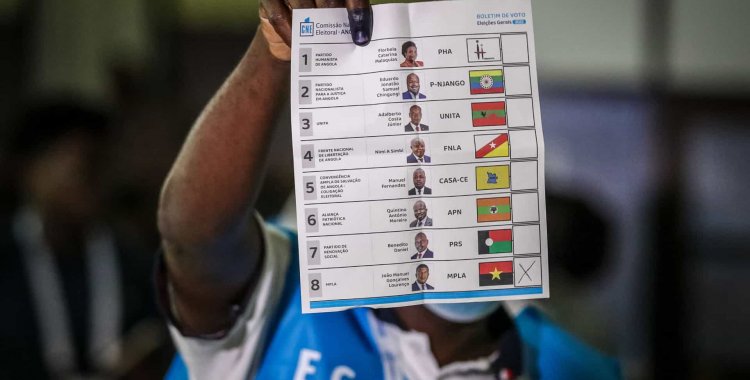With 77.12 percent of votes cast in Luanda, the most populous province in the country, the National Union for the Total Liberation of Angola (UNITA) leads with 62.93 percent of the votes and the Popular Movement for the Liberation of Angola (MPLA) remains in second position with 33.06 percent, CNE spokesman Lucas Quilundo announced this Thursday.
In third, the Social Renewal Party (PRS) appears with 1.18 percent, followed by the National Front for the Liberation of Angola (FNLA), with 1.07 percent, the Humanist Party of Angola (PHA), with 1.02 percent, the Convergência Ampla de Salvação de Angola – Electoral Coalition (CASA-CE), with 0.73 percent, and the National Patriotic Alliance (APN), with 0.48 percent.
With regard to provincial circles, according to the results obtained so far, Luanda and Zaire are the only two of the country's 18 provinces in which the main opposition party has an advantage.
In the oil province in the north of the country, with more than 98 percent of the calculation made, UNITA won 52.25 percent of the electorate's preferences compared to 36.14 percent for the MPLA.
In Cabinda, also rich in "black gold", the dispute remains fierce. At 10h24 am, with less than 22 percent of results counted, the MPLA was ahead with 45.58 percent of the votes, with a slight difference from UNITA (45.28 percent).
Cunene appears, for now, as the main achievement of the MPLA, which gets 81.96 percent of the votes of voters in this southern province, against 15.20 percent for UNITA.
In the second most populous province, Huíla, with more than 88 percent of the results, the MPLA dominates with 67.51 percent of the votes, while UNITA does not exceed 30 percent.
In Benguela, the country's third largest province, where more than 94 percent of the results were counted, the MPLA remains in first place with 53.77 percent of the votes and UNITA wins 42.90 percent.
In Huambo, the fourth largest in terms of population, with 97 percent of votes cast, the MPLA wins with 57.31 percent and UNITA does not go beyond 38.62 percent.
Bié, birthplace of UNITA founder Jonas Savimbi, gives the victory to the MPLA with 60.44 percent, while the main opposition party stands at 35.11 percent, with 88 percent of the votes being scrutinized.
In Bengo, with the vote practically concluded (99.47 percent), the MPLA wins with 55.4 percent of the total, while UNITA stands at 39.21 percent.
In Kwanza Norte, almost completely counted, the MPLA also wins with 60.68 percent, while UNITA wins 32.48 percent of the votes, with the MPLA being the most expressive victory in Kwanza Sul, with 67.95 percent compared to 27.15 percent of UNITA.
In Lunda Sul and Norte, provinces rich in diamonds and with a majority Tchokwe, the PRS party takes third place, with 10.68 percent in Lunda Sul (MPLA, with 52.02 percent and 34.84 percent for UNITA) and 5.58 percent in Lunda Norte (MPLA, with 55.43 percent and UNITA with 34.31 percent).
Also in Moxico, another province with a predominance of Tcokwe, the PRS appears in third place. The MPLA comes in first, with 68.42 percent and UNITA in second, with 26.20 percent of the electorate's preferences.
Malanje, the MPLA's stronghold, once again gives victory to the party that obtains 60.80 percent of the votes against 33.31 percent for UNITA.
In Namibe, the ruling party also leads with 64.25 percent of the vote, while UNITA has 31.87 percent of the votes cast.
In Uíge, 57.65 percent of voters favored the MPLA (UNITA in second place with 35.45 percent), while in Cuando Cubango the ruling party's victory is expressive, with 68.74 percent of the votes (UNITA with 27.05 percent).
The vote also shows that the third and fourth seats of parliament (currently CASA-CE and PRS) may bring some surprises as everything indicates that the vote in CASA-CE will be inexpressive and the parliament will be able to welcome the debutant Bela Malaquias, leader of the PHA.







